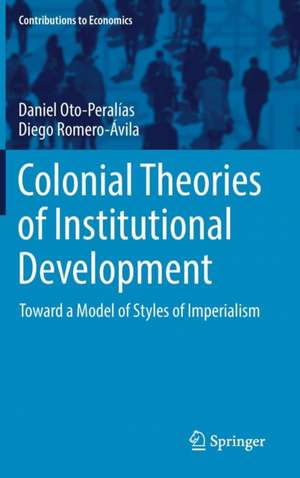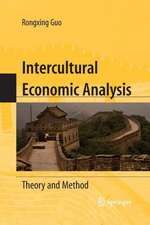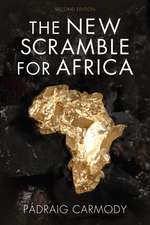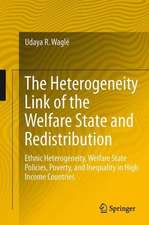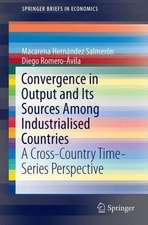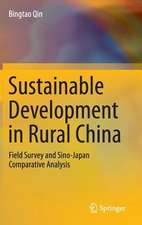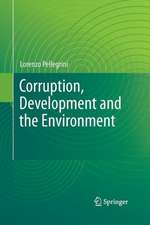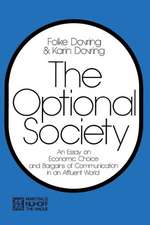Colonial Theories of Institutional Development: Toward a Model of Styles of Imperialism: Contributions to Economics
Autor Daniel Oto-Peralías, Diego Romero-Ávilaen Limba Engleză Hardback – 30 mar 2017
| Toate formatele și edițiile | Preț | Express |
|---|---|---|
| Paperback (1) | 577.22 lei 6-8 săpt. | |
| Springer International Publishing – 21 iul 2018 | 577.22 lei 6-8 săpt. | |
| Hardback (1) | 583.28 lei 6-8 săpt. | |
| Springer International Publishing – 30 mar 2017 | 583.28 lei 6-8 săpt. |
Din seria Contributions to Economics
- 18%
 Preț: 1001.81 lei
Preț: 1001.81 lei -
 Preț: 90.83 lei
Preț: 90.83 lei - 15%
 Preț: 649.06 lei
Preț: 649.06 lei - 18%
 Preț: 1109.92 lei
Preț: 1109.92 lei - 24%
 Preț: 657.09 lei
Preț: 657.09 lei - 18%
 Preț: 976.54 lei
Preț: 976.54 lei - 17%
 Preț: 361.03 lei
Preț: 361.03 lei - 18%
 Preț: 1027.83 lei
Preț: 1027.83 lei -
 Preț: 283.93 lei
Preț: 283.93 lei - 15%
 Preț: 644.95 lei
Preț: 644.95 lei - 15%
 Preț: 638.24 lei
Preț: 638.24 lei -
 Preț: 394.29 lei
Preț: 394.29 lei - 15%
 Preț: 636.80 lei
Preț: 636.80 lei - 15%
 Preț: 637.78 lei
Preț: 637.78 lei - 18%
 Preț: 723.69 lei
Preț: 723.69 lei - 15%
 Preț: 635.47 lei
Preț: 635.47 lei - 15%
 Preț: 634.00 lei
Preț: 634.00 lei -
 Preț: 392.75 lei
Preț: 392.75 lei -
 Preț: 383.33 lei
Preț: 383.33 lei - 15%
 Preț: 637.28 lei
Preț: 637.28 lei - 15%
 Preț: 636.80 lei
Preț: 636.80 lei - 18%
 Preț: 950.96 lei
Preț: 950.96 lei - 15%
 Preț: 634.68 lei
Preț: 634.68 lei -
 Preț: 387.38 lei
Preț: 387.38 lei - 15%
 Preț: 647.27 lei
Preț: 647.27 lei - 15%
 Preț: 636.63 lei
Preț: 636.63 lei - 15%
 Preț: 639.73 lei
Preț: 639.73 lei -
 Preț: 385.62 lei
Preț: 385.62 lei - 15%
 Preț: 641.85 lei
Preț: 641.85 lei - 20%
 Preț: 649.60 lei
Preț: 649.60 lei - 15%
 Preț: 641.71 lei
Preț: 641.71 lei -
 Preț: 387.96 lei
Preț: 387.96 lei - 15%
 Preț: 645.47 lei
Preț: 645.47 lei -
 Preț: 385.08 lei
Preț: 385.08 lei - 15%
 Preț: 646.62 lei
Preț: 646.62 lei -
 Preț: 383.33 lei
Preț: 383.33 lei - 15%
 Preț: 638.43 lei
Preț: 638.43 lei -
 Preț: 381.21 lei
Preț: 381.21 lei - 15%
 Preț: 642.51 lei
Preț: 642.51 lei - 15%
 Preț: 637.78 lei
Preț: 637.78 lei - 15%
 Preț: 641.71 lei
Preț: 641.71 lei -
 Preț: 384.70 lei
Preț: 384.70 lei -
 Preț: 379.86 lei
Preț: 379.86 lei -
 Preț: 378.34 lei
Preț: 378.34 lei -
 Preț: 384.70 lei
Preț: 384.70 lei -
 Preț: 388.52 lei
Preț: 388.52 lei - 15%
 Preț: 641.71 lei
Preț: 641.71 lei -
 Preț: 381.00 lei
Preț: 381.00 lei - 15%
 Preț: 644.95 lei
Preț: 644.95 lei -
 Preț: 386.00 lei
Preț: 386.00 lei
Preț: 583.28 lei
Preț vechi: 686.21 lei
-15% Nou
Puncte Express: 875
Preț estimativ în valută:
111.62€ • 117.37$ • 92.22£
111.62€ • 117.37$ • 92.22£
Carte tipărită la comandă
Livrare economică 16-30 aprilie
Preluare comenzi: 021 569.72.76
Specificații
ISBN-13: 9783319541266
ISBN-10: 3319541269
Pagini: 140
Ilustrații: X, 146 p. 27 illus.
Dimensiuni: 155 x 235 x 11 mm
Greutate: 0.4 kg
Ediția:1st ed. 2017
Editura: Springer International Publishing
Colecția Springer
Seria Contributions to Economics
Locul publicării:Cham, Switzerland
ISBN-10: 3319541269
Pagini: 140
Ilustrații: X, 146 p. 27 illus.
Dimensiuni: 155 x 235 x 11 mm
Greutate: 0.4 kg
Ediția:1st ed. 2017
Editura: Springer International Publishing
Colecția Springer
Seria Contributions to Economics
Locul publicării:Cham, Switzerland
Cuprins
Chapter 1: Introduction.- Chapter 2: Views Linking Colonialism with Institutions.- Chapter 3: A Model of Two Styles of Imperialism.- Chapter 4: Empirical Methodology and Baseline Regression Results.- Chapter 5: Sensitivity to Alternative Theories.- Chapter 6: Further Sensitivity Analyses.- Chapter 7: Exploring the Mechanism of Colonial Rule.- Chapter 8: The Legacy of European Colonialism on Relevant Determinants of Institutional Development.-
Chapter 9: Conclusions.
Notă biografică
Diego Romero-Ávila is Associate Professor at Pablo de Olavide University. He has been Research Fellow at the European Central Bank, Visiting Professor at Vienna University of Economics and Business, and External Consultant at the World Bank. His research interests lie in the fields of Macroeconomics and Development Economics. He has published articles in such academic journals as International Economic Review, Journal of the European Economic Association, Journal of Economic Growth, Journal of Law and Economics, Journal of Money, Credit and Banking, and Economic Inquiry, among others.
Daniel Oto-Peralías is Assistant Professor at St Andrews University School of Management. He holds university degrees in Management and Business Administration and in Law, and has conducted postgraduate studies in economics and politics. He received his PhD from Pablo de Olavide University (Spain) in June 2014. His research focuses on the fields of law and finance and economic development, particularly on the role played by inequality and institutions in economic activity and welfare, paying special attention to the historical processes involved. Daniel has contributed to many economics conferences and has published articles in prestigious economic journals such as Journal of the European Economic Association, Journal of Economic Growth, Journal of Money, Credit, and Banking, and Journal of Law and Economics. During 2016 he undertook consultancy work for the World Bank on the subject of law and development.
Daniel Oto-Peralías is Assistant Professor at St Andrews University School of Management. He holds university degrees in Management and Business Administration and in Law, and has conducted postgraduate studies in economics and politics. He received his PhD from Pablo de Olavide University (Spain) in June 2014. His research focuses on the fields of law and finance and economic development, particularly on the role played by inequality and institutions in economic activity and welfare, paying special attention to the historical processes involved. Daniel has contributed to many economics conferences and has published articles in prestigious economic journals such as Journal of the European Economic Association, Journal of Economic Growth, Journal of Money, Credit, and Banking, and Journal of Law and Economics. During 2016 he undertook consultancy work for the World Bank on the subject of law and development.
Textul de pe ultima copertă
This book analyzes the role played by initial endowments and colonizer identity in seeking to explain institutional development in former colonies. It presents a model of two styles of imperialism that integrates the colonial origin and endowment views explaining current institutions. The authors argue that Great Britain and Portugal adopted an ‘economically-oriented’ style, which was pragmatic and sensitive to initial conditions. For this style of imperialism the endowment view is applicable. In contrast, France employed a ‘politically-oriented’ style of imperialism, in which ideological and political motivations were more present. This led to a uniform colonial policy that largely disregarded initial endowments. In turn, the case of Spain represents a hybrid of the two models. The empirical analysis presented here reveals a remarkable degree of heterogeneity in the relationship of endowments and colonizer identity with current institutions.
Caracteristici
Presents empirical analysis to explain the heterogeneity in the relationship of endowments and colonizer identity with current institutions Analyzes the cases of Great Britain, Portugal, France and Spain Discusses the concepts of ‘economically-oriented’ and ‘politically-oriented’ forms of imperialism
